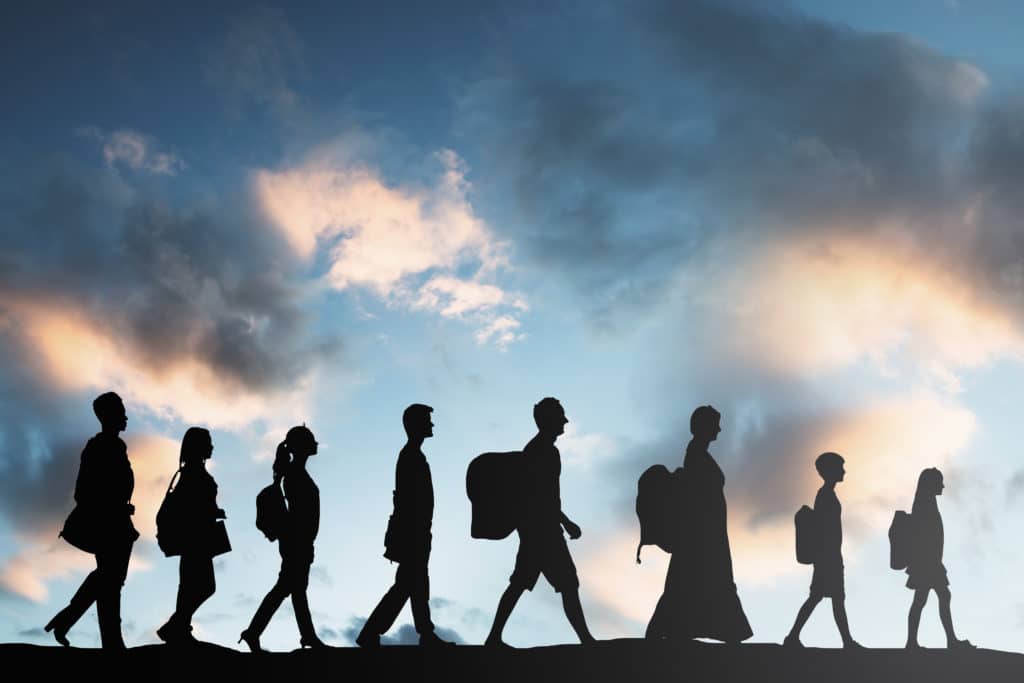Let us begin with Rafi Hottak.
Arrived from crossing the channel
We hurry along the shoreline, the beach barely visible in the dim light preceding dawn, while figures gather at the water’s edge, a mere few hundred metres distant.
A dinghy bobs out at sea. Suddenly, a voice pierces the silence, speaking in Kurdish. “Whose passengers are you?” In the faint dawn, the smuggler assumes we’re prospective customers, eager to board the vessel, and demands to know whom we’ve paid. We identify ourselves as journalists. “Stay out of the way,” he cautions.
A cluster of people congregates on the shore, their movements restless. Among them, I discern women and children, though the majority are men. Some clutch possessions tightly, while others possess nothing but the clothes on their backs. One man hoists a child onto his shoulders. Nearly everyone wears a life jacket.
Ahead, the boat inches closer to shore, already filled halfway with passengers. It seems improbable that all those on land could possibly fit aboard, yet somehow they do. Upon a signal, the process commences: the younger men clamber in first, then aid the women, children, and elderly. It unfolds swiftly. While migrant boats from afar may appear haphazard, up close, there’s a methodical efficiency.
Some individuals leap off, mainly those without life jackets. These are evidently the smugglers, or rather, their aides, dispatched to oversee proceedings. Tension flares momentarily as two passengers squabble over space aboard the boat, resembling a trivial altercation one might witness in a pub between inebriated men. Eventually, they settle beside each other, sullen.
Then the engine roars to life, and the vessel departs. Initially, it struggles, weighed down by around 70 passengers, snagging on a sandbar before nudging forward with concerted effort, vanishing into the morning mist.
‘Migrants are desperate’
We turn to find the smugglers departing. We shouted a query: Are all these individuals Kurds? “Everyone,” comes the reply. “These are my final Kurdish clients. There are no more.” “Why’s that?” He offers a terse response: “Rwanda.” The black-clad smugglers vanish into the haze.
After a considerable interval, we spot police – four officers advancing down the beach. They pose two queries: firstly, whether we observed women and children on the boat (yes), and secondly, if the boat was launched from the beach (no). They’ve just begun their patrol, one officer explains, scanning the tranquil waters with a shrug. It could become hectic.
Throughout the night, we encountered numerous officers who were questioned on the beach, scrutinised as we traversed nearby, and halted at a roadblock. Conversing with a contingent of CRS riot officers on the shore, one lamented the widespread failure to grasp the complexity of their task. “It’s incredibly intricate – the migrants are desperate, and they find ways everywhere. We can’t cover every location at all times.”
Remarkably, the officers manning the roadblock were the same ones we’d encountered on a different beach the prior evening. “Ah, you are back again,” one remarked, offering a smile and handshake.
‘I cannot go to Rwanda’
We encounter two young Sudanese men resolute on reaching Britain. When I inquire about the Rwanda plan, they appear perplexed, unfamiliar with it. Later, we visit an expanding migrant camp, where we chance upon a group of Kurds. They prepare food – the migrants’ makeshift café, brewing potent tea infused with cinnamon. They offer me a cup, which I find delightful.
Omar, kneading dough and serving crispy flatbread with yogurt, recounts his remarkable tale. Two years prior, he left Kurdistan, paying a smuggler $15,000 (£12,000) to reach Britain. After enduring a stroke and failing to secure asylum, he paid another £500 to return to France from Britain. “Here, there’s no washing or bathing,” he laments. “Life is harsh. But in Britain, I had to regularly provide fingerprints and signatures. Once every two weeks. Then they rejected my asylum claim. I couldn’t bear Britain anymore. They could deport me to Rwanda or Iraq. Rwanda – I can’t go there. So, I returned here. But I’m broke. At 52, it’s disheartening to be back, but what choice do I have?”
Listening intently is Barzan, who arrived in the camp five days prior after eight months on the road from Kurdistan. In stark contrast, he’s unperturbed by the Rwanda plan. “People won’t be deterred, no matter what you tell them. Even if you threatened to send them to Africa, they’d still go without hesitation. Rwanda’s better than Kurdistan. But Britain offers work. Its currency is robust. I’m young and eager to forge a future.”
Karwan interjects, dismissing the Rwanda plan with a smile and a shake of his head. “It’s a farce. They started talking about Rwanda two years ago, and nothing came of it. Now, it’s merely for political gain. Nothing more.”
If you like our content, join us in helping to bring reality and decency back by SUBSCRIBING to our Youtube channel: https://www.youtube.com/channel/UCQ1Ll1ylCg8U19AhNl-NoTg AND SUPPORTING US where you can: Award Winning Independent Citizen Media Needs Your Help. PLEASE SUPPORT US FOR JUST £2 A MONTH https://dorseteye.com/donate/












